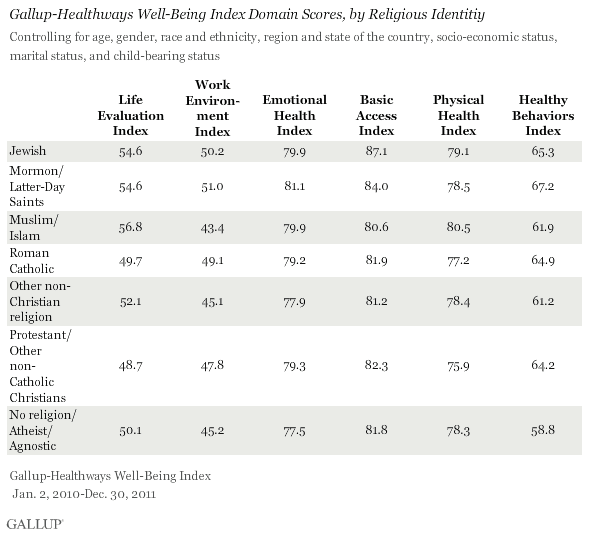This article is part of a special multipart series on religiosity and well-being in America. Previous articles have explored the relationship between religiosity and well-being across the Well-Being Index and sub-indexes, examined religiosity and emotional health, and reviewed the relationship between religion and physical health.
PRINCETON, NJ -- Very religious Americans of all major faiths have higher overall well-being than do their respective counterparts who are moderately religious or nonreligious. This relationship, based on an analysis of more than 676,000 interviews as part of the Gallup-Healthways Well-Being Index, is statistically significant after controlling for major demographic and regional variables.
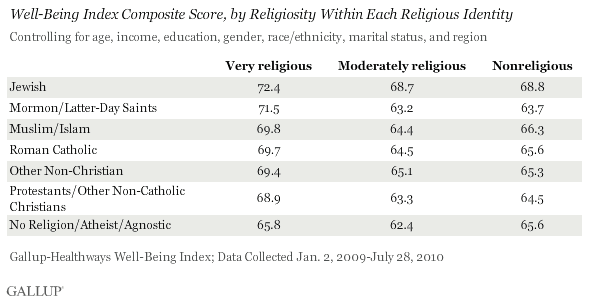
Gallup research has previously documented that Americans who are the most religious have the highest well-being. The current results confirm that this same pattern persists in all major faith groups. The major difference in well-being is between the very religious and the other two groups, although not necessarily in strict progression.
For three religious groups -- Jews, Mormons, and other non-Christians -- those who are nonreligious and moderately religious have essentially the same well-being, both lower than those who are very religious. In four of the groups -- Muslims, Catholics, Protestants, and those with no religious identity -- those who are nonreligious have at least slightly higher well-being than those who are moderately religious. In these last four groups, both the moderately and nonreligious groups have lower well-being than the very religious -- with the exception of those who have no religious identity.
Americans' degree of religiousness, as defined in this analysis, is based on responses to two questions asking about the importance of religion and church attendance, yielding the "very religious," "moderately religious," and "nonreligious" groups. (See page 2 for details of this classification procedure.)
Previous research has shown that religiosity, defined as either church attendance or self-reported importance of religion, is related to age, gender, race and ethnicity, region and state of the country, socio-economic status, marital status, and child-bearing status. Because well-being is also related to these variables, this analysis statistically controls for all of these characteristics.
Jews, Mormons Share the Highest Well-Being Overall, Those With No Religious Identity the Lowest
Jews and Mormons have the highest well-being of any of the faith groups examined in this analysis, while those with no religious identity have the lowest overall well-being.
Analyzing the six well-being sub-indexes reveals the areas in which certain groups excel and others fall behind. Jews score proportionately higher on the Basic Access sub-index. Muslims score higher on the Life Evaluation and Physical Health Indexes, compared with the other faiths. Protestants, on the other hand, score lowest on the Life Evaluation Index and the Physical Health Index, compared with the other faith groups. (See page 2 for descriptions of the sub-indexes.)
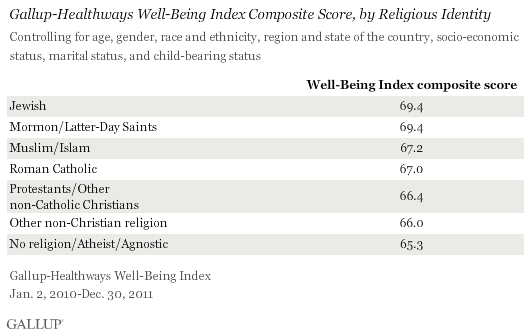
Religious Intensity Greatest for Mormons, Lowest for Jews
Mormons are by far the most religious of these groups, with 73.4% categorized as very religious. Protestants, Muslims, and Roman Catholics are next in order of religiousness, although less than half of the latter two of these groups are classified as very religious. Americans who identify with other non-Christian religions, Jews, and those who have no formal religious identity are the least religious of any of the faith groups. As noted, the relative effect of religiousness on well-being generally persists despite these overall differences.
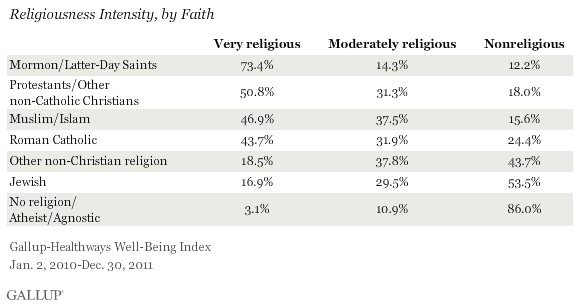
Implications
The findings confirm that the strong positive relationship between religiosity and well-being that Gallup previously demonstrated holds regardless of faith. Furthermore, the relationship appears to be largely independent of the proportions of very religious, moderately religious, and nonreligious in each religious group, and it is more closely aligned with the faith itself. Muslims, for example, have a much lower level of well-being than do Jews. At the same time, the "well-being gap" that exists between Muslims' and Jews' most religious and least religious constituencies is roughly the same, even though Jews have fewer very religious identifiers.
Gallup will continue to explore the relationship between well-being and religion in future articles.
Editor's Note: The article revises and updates a previous analysis based on 2008 and 2009 data.
About the Gallup-Healthways Well-Being Index
The Gallup-Healthways Well-Being Index tracks well-being in the U.S., U.K., and Germany and provides best-in-class solutions for a healthier world. To learn more, please visit well-beingindex.com.
Survey Methods
Results are based on telephone interviews conducted as part of the Gallup-Healthways Well-Being Index survey Jan. 2, 2010-Dec. 30, 2011, with a random sample of 676,080 adults, aged 18 and older, living in all 50 U.S. states and the District of Columbia, selected using random-digit-dial sampling.
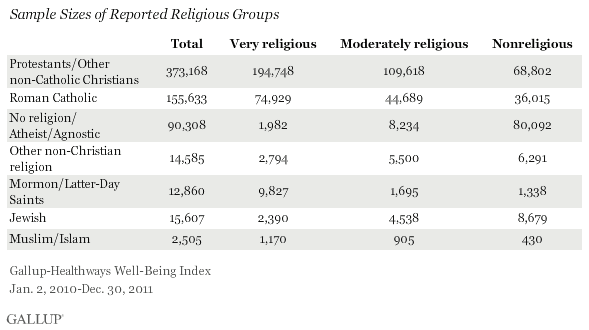
The maximum margin of sampling error found for each reported group will vary according to the size, with the smallest expected error found for the largest reported group. For all three reported Protestant groups, one can say with 95% confidence that the maximum expected error range is no greater than ±0.5%. For smaller groups of fewer than 1,000 respondents, such as some of those found for Mormons, Jews, or Muslims, error ranges can climb as high as ±6.0 percentage points.
Generalized linear model analysis was used to estimate marginal scores for all five reported metrics after controlling for age (in years), gender, race/ethnicity, marital status, education (number of years), log of income, and region of the country.
Interviews are conducted with respondents on landline telephones and cellular phones, with interviews conducted in Spanish for respondents who are primarily Spanish-speaking. Each sample includes a minimum quota of 400 cell phone respondents and 600 landline respondents per 1,000 national adults, with additional minimum quotas among landline respondents by region. Landline telephone numbers are chosen at random among listed telephone numbers. Cell phone numbers are selected using random-digit-dial methods. Landline respondents are chosen at random within each household on the basis of which member had the most recent birthday.
Samples are weighted by gender, age, race, Hispanic ethnicity, education, region, adults in the household, and phone status (cell phone only/landline only/both, cell phone mostly, and having an unlisted landline number). Demographic weighting targets are based on the March 2011 Current Population Survey figures for the aged 18 and older non-institutionalized population living in U.S. telephone households. All reported margins of sampling error include the computed design effects for weighting and sample design.
In addition to sampling error, question wording and practical difficulties in conducting surveys can introduce error or bias into the findings of public opinion polls.
For more details on Gallup's polling methodology, visit www.gallup.com.
- Very religious -- Religion is an important part of daily life and church/synagogue/mosque attendance occurs at least every week or almost every week. This group comprises 41% of the adult population.
- Moderately religious -- All others who do not fall into the very religious or nonreligious groups but who gave valid responses on both religion questions. This group comprises 28.3% of the adult population.
- Nonreligious -- Religion is not an important part of daily life and church/synagogue/mosque attendance occurs seldom or never. This group comprises 30.7% of the adult population.
